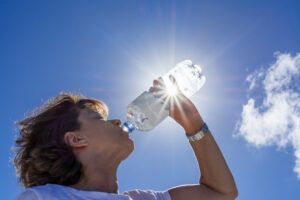This summer, dehydration is not something you want to be a part of your summer vacation. Besides warmer weather, research shows 75% of Americans are chronically dehydrated. Staying hydrated is a simple yet critical part of maintaining good health. Water makes up about 60% of an adult’s body weight, and it plays a crucial role in many of the body’s functions, including regulating body temperature, transporting nutrients, and aiding in digestion. Drinking plenty of water is a simple yet vital part of maintaining good health, especially as we get older.
A lack of hydration can have serious consequences for our health. Even mild dehydration can cause symptoms such as fatigue, headache, and muscle cramps. Chronic dehydration can lead to more serious health problems, including kidney stones, high blood pressure, and even cardiovascular disease. However being adequately hydrated has numerous benefits for the body.
Dehydration can affect physical performance, particularly during endurance activities. Adequate hydration can help reduce these negative effects and improve physical performance. As the cartilage in our joints contains approximately 80% water, staying hydrated helps joints stay well-lubricated, which helps reduce friction by creating more of a “cushion” between the bones. Less friction means smoother-moving joints and fewer aches and pains.

Your brain is strongly influenced by your hydration status. Even mild dehydration can affect memory, mood, concentration, and reaction time. In a study of young women, researchers found that those who were dehydrated had a significant decrease in memory and attention compared to those who were adequately hydrated.
Research shows that when dehydrated, your body stores more heat. This in turn lowers your ability to tolerate hot temperatures. Hydrating helps you produce sweat when you’re overheated which in turn cools your body down. This built-in cooling mechanism is critical in preventing heat stroke and other potentially deadly heat-related conditions.
Water is essential for maintaining healthy skin by helping keep the skin hydrated and plump, which can help to reduce the appearance of fine lines and wrinkles. Adequate hydration can also help to improve skin elasticity and reduce the risk of skin problems such as acne.
Sufficient water intake supports your body’s natural detoxification systems, which remove waste and harmful substances through urination, breathing, perspiration, and bowel movements. Hydrating with plenty of water supports your built-in detox processes and help enhance overall health.
The body needs water to digest food properly. Without enough, you may experience irregular bowel movements, gas, bloating, constipation, heartburn, and other discomforts that can hurt your quality of life. Adequate hydration can help improve digestion and prevent digestive problems.
Drinking water can also help with weight management. It can help fill you up and reduce appetite. In a study of overweight and obese adults, researchers found that those who drank water before meals lost significantly more weight compared to those who did not. One study of women with excess weight found that drinking water before each meal resulted in substantial reductions in body weight, body mass index, and body composition.
Staying hydrated with plenty of water can help dilute the concentration of minerals in your urinary tract and make kidney stones less likely. Water also helps flush harmful bacteria from your bladder and can aid in preventing urinary tract infections (UTIs).
As your blood is made up largely of water, not drinking enough can cause your blood When you to become concentrated, which can cause an imbalance of vital minerals (electrolytes). These minerals, like potassium and sodium, are key to the proper functioning of your heart.
Mild fluid loss can cause the brain to contract away from the skull, leading to headaches and migraines in some people. Studies show that even mild dehydration, such as the loss of 1–3% of body weight, can impair many aspects of brain function. Research has shown that a headache is one of the most common symptoms of dehydration.
So, how much water should you be drinking? It’s commonly recommended that you drink eight 8-ounce (237-mL) glasses of water per day (the 8×8 rule). However, this may vary depending on factors such as your age, gender, and level of physical activity. You can also use the body weight formula which is to take one-third of your body’s weight and drink that number of ounces in fluids.
Water is the first-choice beverage for best hydration. Choose it over sugary drinks like soda or juice, which can be high in simple sugars and calories. Eating fresh fruits and vegetables that are full of water helps with this daily water intake.
Making sure that you get enough water each day is one of the best things you can do for your overall health. West Tennessee Medical Group has Primary Care providers that can help you determine if you are staying adequately hydrated and help treat symptoms if you are not. Click here to find a provider near you.
